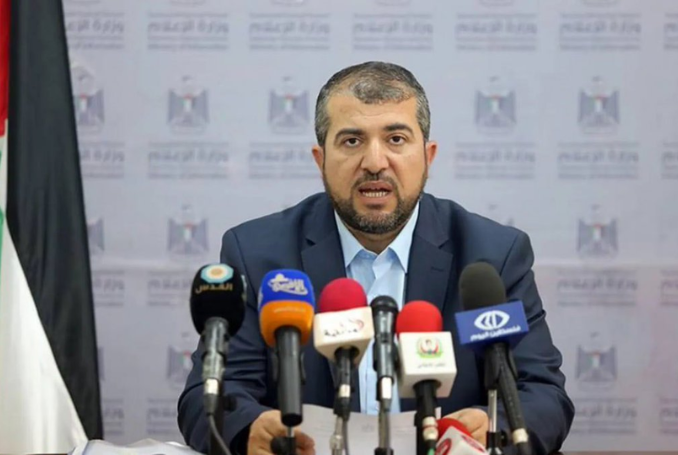
Dr. Munir al-Bursh, Gaza’s Health Director, warns that tens of thousands of lives are at risk due to the ongoing blockade of medical supplies and the collapse of healthcare services in northern Gaza.
In an interview with Al-Jazeera, Dr. Munir al-Bursh, the Director General of the Ministry of Health in the Gaza Strip, urgently called for increased international pressure on the Israeli occupation to allow medical teams to enter northern Gaza and assist in saving the lives of residents.
He highlighted the devastating impact of the destruction of hospitals, which has contributed to the deaths of tens of thousands of people.
Al-Bursh explained that the Israeli occupation continues to severely delay the humanitarian provisions outlined in the ceasefire agreement, particularly the entry of essential medical supplies, medicines, equipment, and electricity generators into Gaza.
He emphasized that the delay in transferring field hospitals and medical equipment from southern Gaza to the north is exacerbating the health crisis, where medical services have nearly completely halted.
🔴Director General of Ministry of Health in Gaza, Dr. Munir Al bursh:
In every demolished house, you will find its owners having set up a tent…they want to stay in their homeland, in their land and will not leave it.
[G&T]
— Moh Musthafa Hussain (@musthafaaa) February 4, 2025
Al-Bursh specifically called for the entry of medical delegations, noting that these teams would be critical in performing special operations that have been urgently needed throughout the war.
He stressed that bringing these delegations into Gaza is far more urgent than evacuating the wounded, as the equipment needed to carry out life-saving surgeries is unavailable in the region. He also explained that many of these delegations could also help train local medical staff in performing these complex procedures, a step that could significantly alleviate the ongoing health crisis.
In addition to requesting the medical teams, al-Bursh underscored the need for a safe passage to evacuate the wounded. Despite the ceasefire agreement allowing for the exit of 300 wounded individuals per day, only a very small fraction of those have been able to leave, and many of the evacuees are children rather than actual casualties.
He shared that a list of 400 children under the age of six had been submitted for evacuation but was repeatedly rejected by the Israeli occupation, citing “security reasons.” This inaction has led to heartbreaking consequences, with at least 100 children dying in recent months due to the occupation’s refusal to allow their evacuation, despite their eligibility to cross.
Dr. Munir al-Bursh, the General-Director of Gaza’s Ministry of Health, prays inside the besieged Indonesian Hospital in northern Gaza, surrounded by Israeli tanks, drones and planes.
FOLLOW OUR LIVE BLOG: https://t.co/aoNLznDjzG pic.twitter.com/6RvY6GLGhs
— The Palestine Chronicle (@PalestineChron) November 22, 2023
Al-Bursh described the situation in northern Gaza as a humanitarian catastrophe, worse than the immediate effects of the war. The lack of medical services, particularly for patients with chronic conditions such as kidney failure, heart disease, and other serious health problems, has resulted in devastating losses.
He pointed out that Al-Shifa Hospital, which is already overwhelmed, can only accommodate 70 kidney dialysis cases, but has seen 200 new patients since displaced families were allowed to return. The shortage of essential supplies, such as dialysis equipment, has further contributed to the crisis, and patients are being turned away.
One of the most pressing concerns, according to al-Bursh, is the collapse of hospitals like the Indonesian hospital, which is unable to function due to the absence of critical equipment such as oxygen units and electricity generators.
Despite the ceasefire agreement stipulating the urgent need for such supplies to be brought in, the occupation has prevented these essential items from entering the region.
Al-Bursh also revealed that field hospitals, including a 600-bed Qatari hospital and one from the French Doctors Without Borders organization, were supposed to be transferred to the north to provide urgent care but have been blocked by the Israeli occupation. These hospitals could have been crucial in addressing the growing medical needs of the population in northern Gaza, but their transfer has been delayed indefinitely.
In addition to the lack of medical care, al-Bursh spoke of the severe shortages in basic necessities like food, clean water, and shelter, which continue to make survival in Gaza a daily struggle.
He expressed that the destruction of the health infrastructure in Gaza has led to more deaths than the direct violence of the occupation itself. According to al-Bursh, the lack of access to health services—especially for vulnerable populations like children and dialysis patients—has been responsible for a significant portion of the casualties.
He noted that 40% of kidney dialysis patients alone have died because they were unable to receive the necessary care during the war.
Despite repeated requests for assistance, al-Bursh confirmed that international organizations and the United Nations have faced significant delays in delivering aid, primarily due to bureaucratic hurdles and the need for Israeli approval.
He called on the international community to act swiftly to address the crisis, ensuring that the necessary medical supplies, field hospitals, and humanitarian aid are allowed into Gaza without further obstruction.
(PC, AJA)